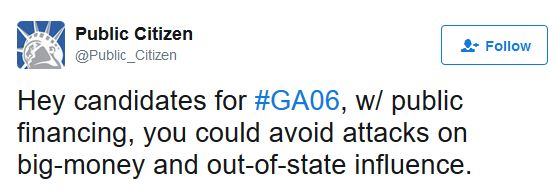Republicans, desperate for any good news this autumn, are buzzing about Barron’s predictions that the GOP will lose just 8 to 14 seats in the House, and 3 in the Senate – not exactly a GOP landslide, but enough to hold both chambers in Congress.
Barron’s analysis is based “in almost every race” on which candidate has raised the most money. This system, we are informed, has been successful in predicting 93% of House winners since 1972, and 98% “in more recent years.” At the Senate level, it has been successful in 89% of races since 1996 (why don’t they tell us here what the numbers are since 1972?)
We anticipate that advocates of regulation will point to Barron’s analysis as proof that money buys elections. But Barron’s argues that the relationship is more complex:
Tracking each candidate’s funding is “exceptionally valuable because it tells you who has support,” says William Morgan, executive director of the renowned Mid-West Political Science Association in Bloomington, Ind. The cognoscenti, he says, give the most money to the candidate they believe has a good chance of winning.
In other words, raising money both represents popular support, and the belief of knowledgeable contributors that a candidate will win, or at least be competitive (presumably donors don’t want to waste money on clear losers.) Also important as a predictor is not the raw amount of money raised, but the number of contributors. (It is not clear from Barron’s to what extent, if any, they account for self-funding by candidates such as Ned Lamont and others(. As Barron’s notes, fundraising success is “a sign of superior grass-roots support.” Of course, no one disputes that money plays a major role in winning, and we agree with Barron’s that money often represents popular support. But our belief on money’s ultimate effect is more in line with that of Duke University’s John Aldrich, whom Barron’s obligingly cites:
John Aldrich, a professor of political science at Duke University who writes extensively about elections, says that a candidate really doesn’t need the most money to win; he merely requires enough cash to get his message across. Aldrich believes Democrats will win this year with less money because they won’t have to spend so much to persuade voters to switch horses.
In fact, this has been the general belief among political scientists for many years, based primarily on groundbreaking research in the 1980s by Gary Jacobson. In recent years, a few researchers have claimed to find that money plays a larger role in who wins and who loses, while other research continues to support Jacobson’s original findings. Obviously, having money helps, and obviously an underfunded candidate is unlikely to win. Other things also help, including newspaper endorsements, party ID and support, and so on. We’re quite sure that, running for office, we’d rather have more money than less. But at this point, we are unconvinced by the research that purports to overthrow the 20 year consensus that money is important, but hardly decisive.
But there is another twist. In fact, the gaudy success rates of Barron’s formula are not so impressive as it first appears. Consider that there are probably no more than six toss up Senate races this year. If you randomly picked half of those races correctly, and otherwise the favorites held (as they usually do), you would have picked over 90% of Senate races correctly.
Indeed, in these recent election cycles, Barron’s would have done as well or better merely by predicting all ncumbents to win. This is where it becomes important that rules do not artificially favor incumbents. In fact, we believe that our current rules do. Challengers historically are more reliant than incumbents on large contributions, so limits on contributions may disproportionately harm challengers. Raising contributions under a system of limits places a premium on prior name recognition, time, and a pre-existing fund raising list. All of these benefit incumbents, who are known to potential donors, who usually know long before challengers that they are going to run, and who have run in the past and so have a list of supporters already in place.
We don’t know if Barron’s will prove right or wrong. If Republicans hold their majorities, it may be more due to other factors noted in the Barron’s article:
[U]nemployment remains relatively low, at 4.6%, and disposable-income growth is positive. … “voters will continue to focus on pocketbook issues like the price of gas and the value of their 401(k)s,” says GOP insider Rick Hohlt. Pump prices have been falling and the Dow Jones Industrial Average has been on a tear, reaching 12,000 last week.
Meanwhile, we also continue to adhere to first principles: If money may be the mother’s milk of politics, it is also the mother’s milk of free speech in a modern, mass communication society; and it is dangerous to give the government control over political speech.














